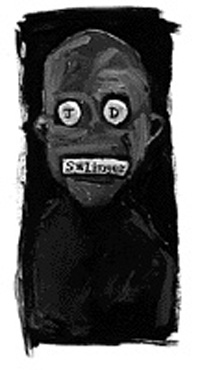 An Interview With J.D. Salinger
An Interview With J.D. Salinger
Interview Transcribed by Daniel Davis
illustration by Michael Corcoran
World-renowned author J.D. Salinger recently agreed to break his 40-year silence, consenting to an exclusive interview with the internationally-acclaimed literature/music/fashion critic, Jean-Paul Bavard. They spoke about such topics as Salinger’s previous work, his new projects, and the state of contemporary art and literature. Here is the transcript of their conversation.
Jean-Paul Bavard: You have not published one of your genius comedies since your award-winning, brilliant satire “L’attrapeur Dans le Seigle,” or “The Receiver on Rye,” as it is known here in les Etats Unis. Why do you think that publishers are fearful to print your genius work? Is it perhaps anti-Semitism?
J.D. Salinger: Um… I don’t even know where to begin to respond to that. First of all…
Jean-Paul Bavard: There is no need to be afraid to speak your mind. I will pull together the many disparate ramblings of your conversation into a coherent masterpiece of literary observation and comment. This is my calling as a noted critic and essayist. When I spoke with the famed genius SuperSupermodel Iman, I was able to capture the very essence of her observations on paper in way of such depth which has never been attempted before. As a fellow homme des lettres, I am sure you are familiar with my famed SuperSupermodel interview series that appeared in Les Buffoneries Babilliard magazine in 1992. It proved tres enlightening, and was nominated for many awards by the Fashion Journalism industry, including the coveted Legion de Jaseur Award, which was created just for my writings by the Academie de Fashion Internationale. The award itself is a fabulous trophy, a surrealist brass sculpture by the brilliant artist Howard McNear, that, in my opinion, perfectly expresses the contemporary media’s constant struggle to accurately reflect the constantly changing currents on the cutting edge of international fashion.
J.D. Salinger: I don’t know about that, but…
Jean-Paul Bavard: McNear, as I’m sure you’re aware, is a brilliant unknown Californian artist of the 1960s and ’70s. Many new underground Indie Pop groups have rediscovered his deconstructionist brilliance, and have appropriated his images for their album covers. In fact, the critically acclaimed New Jersey Apres Garde Noir-Wave group Mulewax features a blurred photo of McNear’s most famous work, “Pancreas or Pork Chop?” on the cover of their brilliant new album, Hey, What Do All These Knobs Do, Anyway? As we all know, the entire Apres Garde Noir-Wave movement has been discredited, with the advent of the CyberTechnoTrance movement, spearheaded by such geniuses as The Chemical Brothers and Prodigy. Of course, this should not be construed as any repudiation of the work of the visionary McNear, as his most powerful and influential work was accomplished some three decades avant. This phenomenon is a common occurrence in Contemporary Art, although perhaps not so common in your field of Light Comic Novellas. Why must this be so?
J.D. Salinger: What?
Jean-Paul Bavard: Ah, the famed Salinger reticence. The world is curious to hear of your genius opinions, since it has been so long since you have agreed to a formal interview. In fact, your only public comment in the past 40 years has been to accuse the government of blowing up a TWA airplane avec une missile, based on a conspiracy theory published on Le Monde Wide Web. Why did you choose such an occasion to break your silence, and why did you select such a tragic event, with so little evidence to back your claim? Were you perhaps joking, and displaying the famed satirical skills displayed in your Light Comic Novellas?
J.D. Salinger: Are you talking about Pierre Salinger? My name is J.D. Salinger! I’m an author, and I came here to…
Jean-Paul Bavard: Ah, so it is just as I theorized! You were making an elaborate humorous statement about the media coverage and the Bureau de Investigation Federale exploration of an American tragedy! Brilliant! It challenges the very barriers of contemporary literature, pushes on the envelope of reality and surreality, as once did fellow geniuses such as Dali, and DeLuise! I applaud your daring choice of the Internet, for as we all know, the Internet is the medium of the future, and one day soon all communication will occur through modems and electronic mail, including the hailing of taxicabs and the ordering of sushi. L’Internette will become the home of all art and commerce, and I predict that computers will eventually replace all currency, requiring the development of wallets of a size beyond our current imagination. What role will your Art play in such a wondrous future?
J.D. Salinger: I don’t really think that the…
Jean-Paul Bavard: Certainly you have new writing projects for upcoming release which prominently feature the Internet and the World Wide Web as major characters in the drama of contemporary society’s conflicts with le technologie and computer culture, much as the Chemical Brothers have brilliantly done on their latest release, where the repetitive sample of a silly person shouting the phrase “Block-Rockin’ Beats!” comes to represent mankind’s primal scream of frustration with the difficulty of logging on to America Online, on the superficial level, and the ultimate rejection of melody, songwriting, artistry and logic, on a deeper level – symbolically speaking, of course. Surely you have similar thoughts on the genius of the Chemical Brothers?
J.D. Salinger: The Chemical Brothers? What are you talking about? I want to discuss my latest novel, which is nearing completion –
Jean-Paul Bavard: Wittgenstein, in his classic treatise, “On Certainty,” once wrote “it is difficult to begin at the beginning, and not to try to go further back.” Clearly, your writing has been influenced by this concepte philosophicale. Have you ever experimented with not starting a novel on Page 1, but instead perhaps on Page 73, or perhaps even in negative page numbers?
J.D. Salinger: Why would anyone do such a thing? What does this have to do with my writing? Why won’t you ask me about my new book?
Jean-Paul Bavard: I see by your questions that you have perhaps not been able to follow the intellectual depth of my conversation. Do not despair; this is a common problem. When I spoke to the fabulous filmmaker Antonioni, his apparent digestive problems distracted him from understanding my investigative journalistic queries. I will endeavor to speak my words more slowly to increase your comprehension, mais non?
J.D. Salinger: That’s it! I didn’t come here to be insulted, you obnoxious twit!
Jean-Paul Bavard: Apparently, the literary giant J.D. Salinger has been called away on important business, no doubt some sort of seminar on L’Internette, or perhaps CyberTechnoTrance music, and has had to take his leave. We thank him for his appearance, and hope that he has perhaps learned important concepts from this discussion that will no doubt improve his forthcoming novel, which he has so typically avoided all discussion of. I am quite certain that our frank exchange of ideas has inspired him to reexamine his work, to reassess many artistic concepts, and the world awaits the no doubt much-improved result.



